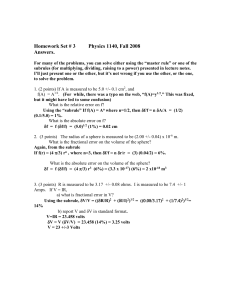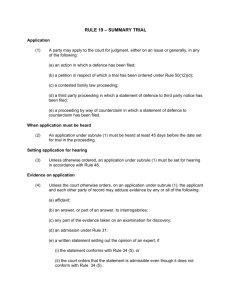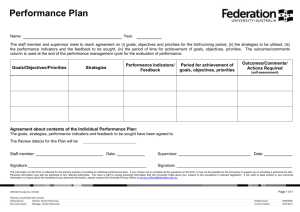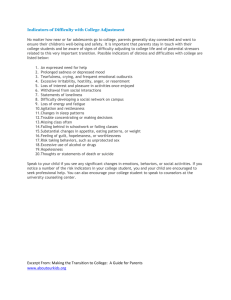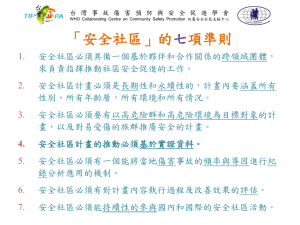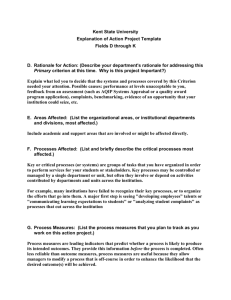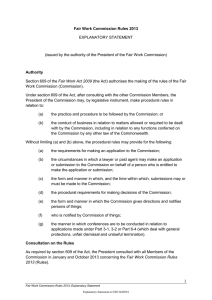Summary of ChangesChap24
advertisement
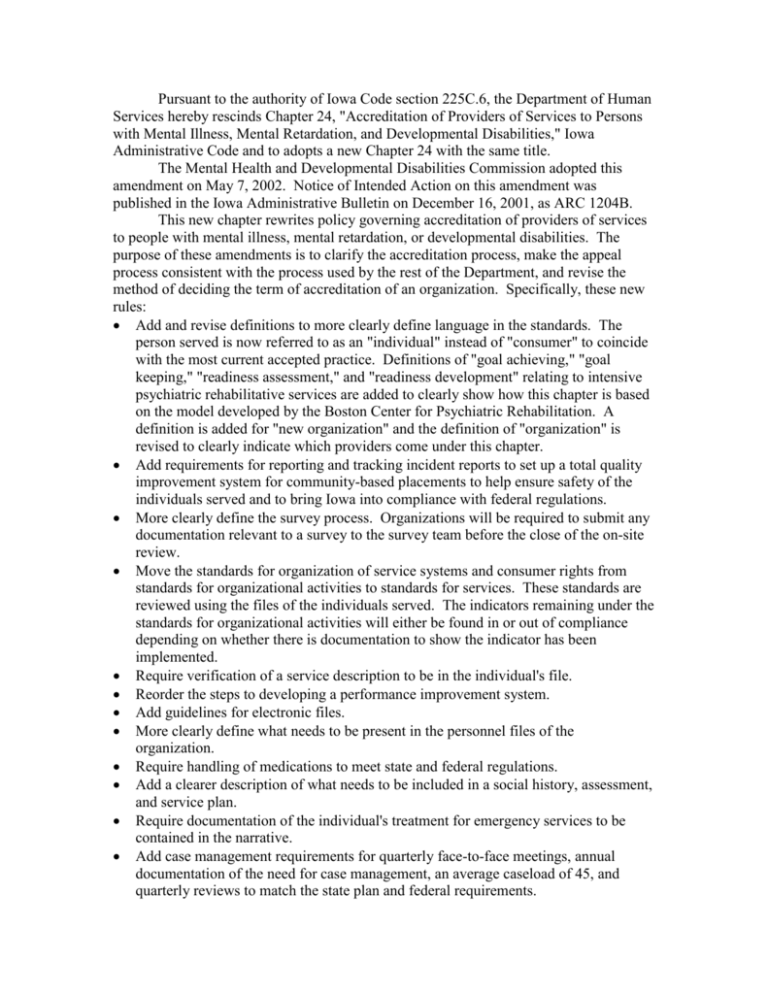
Pursuant to the authority of Iowa Code section 225C.6, the Department of Human Services hereby rescinds Chapter 24, "Accreditation of Providers of Services to Persons with Mental Illness, Mental Retardation, and Developmental Disabilities," Iowa Administrative Code and to adopts a new Chapter 24 with the same title. The Mental Health and Developmental Disabilities Commission adopted this amendment on May 7, 2002. Notice of Intended Action on this amendment was published in the Iowa Administrative Bulletin on December 16, 2001, as ARC 1204B. This new chapter rewrites policy governing accreditation of providers of services to people with mental illness, mental retardation, or developmental disabilities. The purpose of these amendments is to clarify the accreditation process, make the appeal process consistent with the process used by the rest of the Department, and revise the method of deciding the term of accreditation of an organization. Specifically, these new rules: Add and revise definitions to more clearly define language in the standards. The person served is now referred to as an "individual" instead of "consumer" to coincide with the most current accepted practice. Definitions of "goal achieving," "goal keeping," "readiness assessment," and "readiness development" relating to intensive psychiatric rehabilitative services are added to clearly show how this chapter is based on the model developed by the Boston Center for Psychiatric Rehabilitation. A definition is added for "new organization" and the definition of "organization" is revised to clearly indicate which providers come under this chapter. Add requirements for reporting and tracking incident reports to set up a total quality improvement system for community-based placements to help ensure safety of the individuals served and to bring Iowa into compliance with federal regulations. More clearly define the survey process. Organizations will be required to submit any documentation relevant to a survey to the survey team before the close of the on-site review. Move the standards for organization of service systems and consumer rights from standards for organizational activities to standards for services. These standards are reviewed using the files of the individuals served. The indicators remaining under the standards for organizational activities will either be found in or out of compliance depending on whether there is documentation to show the indicator has been implemented. Require verification of a service description to be in the individual's file. Reorder the steps to developing a performance improvement system. Add guidelines for electronic files. More clearly define what needs to be present in the personnel files of the organization. Require handling of medications to meet state and federal regulations. Add a clearer description of what needs to be included in a social history, assessment, and service plan. Require documentation of the individual's treatment for emergency services to be contained in the narrative. Add case management requirements for quarterly face-to-face meetings, annual documentation of the need for case management, an average caseload of 45, and quarterly reviews to match the state plan and federal requirements. Revise the subrule on intense psychiatric rehabilitation to more clearly define the components required in the Boston Psychiatric Rehabilitation Model. Require supported community living to include provisions for skill training. Require emergency services to be documented in a narrative format and coordination of contacts to be made with relevant professionals. Clarify the application process and approval process for deemed status. Revise the policies governing the period of accreditation to provide that the term of accreditation is now determined by counting the percentage of all applicable performance indicators achieved. Under these amendments, 15 percent of the total potential score is allocated to policy and procedure indicators, 15 percent to organizational activity indicators, and 70 percent to service indicators. Require an organization whose accreditation has been denied or revoked to wait at least six months from the notice of decision before it can apply as a new provider. Provide that when an organization is deemed, it will no longer be required to be responsible for meeting all requirements under this chapter. The organization will be held to the corrective action plan of the national accrediting body or the HCBS certification report. The organization shall also be required to meet the requirements for incident reports and the complaint process. A public hearing on this amendment was held on January 18, 2002, and the Department received ten written comments. Concerns related to definitions; organizational activity standards on leadership, management of information, and human resources; service standards relating to social histories, assessments, individual service plans, service documentation, incident reports, case management, intensive psychiatric rehabilitation services, supported community living, and outpatient psychotherapy and counseling; and procedures for accreditation and deemed status. In response to these comments and further internal review, the Department has made the following changes to the Notice of Intended Action: The definition of "advanced registered nurse practitioner" is revised to specify that registration must be for advanced practice in a psychiatric setting. The definitions of "case management" and "supported community living" have been moved to the specific subrules for those service in rule 441—24.4(225C), to be parallel with standards for the other services. The definitions of "consultation services" and "education services" have been deleted, since these terms are not used in the new chapter. The definitions of "credentialed staff" and "credential verification process" have been deleted and their substance has been added to subrule 24.3(4) on human resources. The definition of "direct service" has been revised to remove the phrase 'involving direct interaction" because of unintended implications for case management services. The definition of "division" has been revised due to Departmental restructuring. The definition of "functional assessment' has been revised to remove the word "task." The definitions of "human services field" and "qualified in a human services field" have been removed, and the list of examples of acceptable fields has been added to the definition of "qualified case managers and supervisors." The definition of "incident" has been substantially revised to clarify what situations are covered. The definition of "individual" has been removed because of conflicts with other intended used of the word, and the phrase "individual using the service" has instead been added throughout the rules where applicable. The definition of "mental health professional" is revised to add references to other categories of professionals defined in the rules. The wording of performance indicator (4) under subrule 24.3(1) is revised to crossreference standards on incident reports. Performance indicators for management information systems in subrule 24.3(3) are reworded to clarify that they apply only to information identifying individuals using the services. Performance indicators for human resources in subrule 24.3(4) are reworded to eliminate references to "distribution of duties" and "statutory obligations," eliminate requirements already referenced in Iowa Code section 135C.33, limit the abuse training requirements to staff who are mandatory abuse reporters, and clarify that record check requirements apply to staff who meet with individuals using the service in the individuals' homes. Performance indicators for social histories in subrule 24.4(1) are reworded to clarify that the organization may use social histories from other sources to add requirements for developmental history for children and substance abuse, domestic violence, and physical, emotional or sexual abuse history for all individuals using the service. Three performance indicators in subrule 24.4(2) for documentation of different diagnoses have been combined into one indicator that applies to all assessments. Performance indicators for individual service plans in subrule 24.4(3) are revised to combine two indicators relating to the contribution of the individual using the service in defining desired goals and outcomes into a single indicator. Standards on incident reports in subrule 24.4(5) have been substantially reworked. Requirements for listing on the report the actual names of other individuals using the service, for keeping copies of the report both in a central file and in the individual record, and for sending copies of the report to the individual using the service, the individual's legal guardian, and medical personnel are removed. The expanded definition of "incident" is moved to rule 441--24.1(225C). A performance indicator on guardianship and other legal papers that was previously in Chapter 24 but was inadvertently omitted from the Notice of Intended Action is added to subrule 24.4(6). Wording in performance indicators relating to individual rights in subrule 24.4(8) was rearranged to clarify that organizations must inform both individuals using the service and their guardians about the organization's appeal process. Performance indicators for case management services in subrule 24.4(9) are revised to split the requirement for documentation of contacts and for quarterly face-to-face meetings into two indicators. Performance indicators for intensive psychiatric rehabilitation services in subrule 24.4(10) are revised to lower the frequency of required documentation, allow the individual using the service to document satisfaction (instead of staff), and to narrow and clarify the scope of what must be documented. Performance indicators for supported community living services in subrule 24.4(12) are revised to eliminate the phrase "that includes a task analysis of daily living skills" from the requirement for a functional assessment. The components of rule 441--24.5(225C) are rearranged to be presented in the order of the accreditation process. An address for submitting applications is added to the introductory paragraph, and a provision prohibiting an organization from reapplying within six months after denial or revocation has been removed. (The provision requiring denial of a reapplication made under those circumstances remains in the rules.) Counts of indicators have been adjusted to reflect revisions to the Notice of Intended Action, and a table of indicator counts and point values for each service is added to new subrule 24.5(4), paragraph "b." A requirement is added to subrule 24.6(4) for deemed facilities to meet the incident report standards in subrule 441—24.4(5). The address for submitting complaints in subrule 24.7(1) is changed due Department restructuring. This amendment is intended to implement Iowa Code chapter 225C. This amendment shall become effective on September 1, 2002. The following amendment is adopted. Rescind 441—Chapter 24 and adopt the following new 441—Chapter 24 in lieu thereof:
